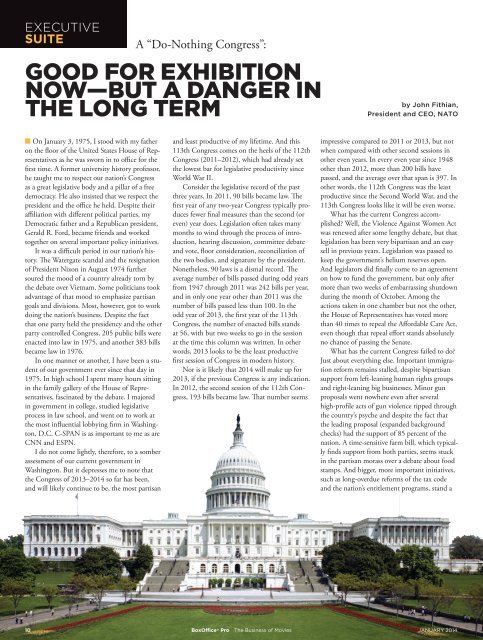You also want an ePaper? Increase the reach of your titles
YUMPU automatically turns print PDFs into web optimized ePapers that Google loves.
EXECUTIVE<br />
SUITE<br />
A “Do-Nothing Congress”:<br />
GOOD FOR EXHIBITION<br />
NOW—BUT A DANGER IN<br />
THE LONG TERM<br />
by John Fithian,<br />
President and CEO, NATO<br />
n On <strong>January</strong> 3, 1975, I stood with my father<br />
on the floor of the United States House of Representatives<br />
as he was sworn in to office for the<br />
first time. A former university history professor,<br />
he taught me to respect our nation’s Congress<br />
as a great legislative body and a pillar of a free<br />
democracy. He also insisted that we respect the<br />
president and the office he held. Despite their<br />
affiliation with different political parties, my<br />
Democratic father and a Republican president,<br />
Gerald R. Ford, became friends and worked<br />
together on several important policy initiatives.<br />
It was a difficult period in our nation’s history.<br />
The Watergate scandal and the resignation<br />
of President Nixon in August 1974 further<br />
soured the mood of a country already torn by<br />
the debate over Vietnam. Some politicians took<br />
advantage of that mood to emphasize partisan<br />
goals and divisions. Most, however, got to work<br />
doing the nation’s business. Despite the fact<br />
that one party held the presidency and the other<br />
party controlled Congress, 205 public bills were<br />
enacted into law in 1975, and another 383 bills<br />
became law in 1976.<br />
In one manner or another, I have been a student<br />
of our government ever since that day in<br />
1975. In high school I spent many hours sitting<br />
in the family gallery of the House of Representatives,<br />
fascinated by the debate. I majored<br />
in government in college, studied legislative<br />
process in law school, and went on to work at<br />
the most influential lobbying firm in Washington,<br />
D.C. C-SPAN is as important to me as are<br />
CNN and ESPN.<br />
I do not come lightly, therefore, to a somber<br />
assessment of our current government in<br />
Washington. But it depresses me to note that<br />
the Congress of 2013–<strong>2014</strong> so far has been,<br />
and will likely continue to be, the most partisan<br />
and least productive of my lifetime. And this<br />
113th Congress comes on the heels of the 112th<br />
Congress (2011–2012), which had already set<br />
the lowest bar for legislative productivity since<br />
World War II.<br />
Consider the legislative record of the past<br />
three years. In 2011, 90 bills became law. The<br />
first year of any two-year Congress typically produces<br />
fewer final measures than the second (or<br />
even) year does. Legislation often takes many<br />
months to wind through the process of introduction,<br />
hearing discussion, committee debate<br />
and vote, floor consideration, reconciliation of<br />
the two bodies, and signature by the president.<br />
Nonetheless, 90 laws is a dismal record. The<br />
average number of bills passed during odd years<br />
from 1947 through 2011 was 242 bills per year,<br />
and in only one year other than 2011 was the<br />
number of bills passed less than 100. In the<br />
odd year of 2013, the first year of the 113th<br />
Congress, the number of enacted bills stands<br />
at 56, with but two weeks to go in the session<br />
at the time this column was written. In other<br />
words, 2013 looks to be the least productive<br />
first session of Congress in modern history.<br />
Nor is it likely that <strong>2014</strong> will make up for<br />
2013, if the previous Congress is any indication.<br />
In 2012, the second session of the 112th Congress,<br />
193 bills became law. That number seems<br />
impressive compared to 2011 or 2013, but not<br />
when compared with other second sessions in<br />
other even years. In every even year since 1948<br />
other than 2012, more than 200 bills have<br />
passed, and the average over that span is 397. In<br />
other words, the 112th Congress was the least<br />
productive since the Second World War, and the<br />
113th Congress looks like it will be even worse.<br />
What has the current Congress accomplished?<br />
Well, the Violence Against Women Act<br />
was renewed after some lengthy debate, but that<br />
legislation has been very bipartisan and an easy<br />
sell in previous years. Legislation was passed to<br />
keep the government’s helium reserves open.<br />
And legislators did finally come to an agreement<br />
on how to fund the government, but only after<br />
more than two weeks of embarrassing shutdown<br />
during the month of October. Among the<br />
actions taken in one chamber but not the other,<br />
the House of Representatives has voted more<br />
than 40 times to repeal the Affordable Care Act,<br />
even though that repeal effort stands absolutely<br />
no chance of passing the Senate.<br />
What has the current Congress failed to do?<br />
Just about everything else. Important immigration<br />
reform remains stalled, despite bipartisan<br />
support from left-leaning human rights groups<br />
and right-leaning big businesses. Minor gun<br />
proposals went nowhere even after several<br />
high-profile acts of gun violence ripped through<br />
the country’s psyche and despite the fact that<br />
the leading proposal (expanded background<br />
checks) had the support of 85 percent of the<br />
nation. A time-sensitive farm bill, which typically<br />
finds support from both parties, seems stuck<br />
in the partisan morass over a debate about food<br />
stamps. And bigger, more important initiatives,<br />
such as long-overdue reforms of the tax code<br />
and the nation’s entitlement programs, stand a<br />
10 BoxOffice ® <strong>Pro</strong> The Business of Movies JANUARY <strong>2014</strong>

















